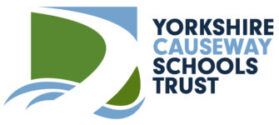Subject Leader
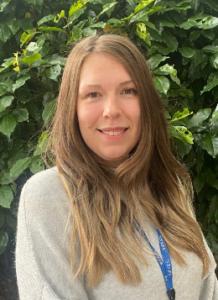
The subject leader for History is Miss Emsley.
They can be contacted by emailing admin@stpeters.ycway.uk using the subject title FAO of followed by the name of the subject leader. Emails typically receive a reply within 2-3 working days. Please note most of our subject leaders have a full-time teaching commitment.
With oversight and support from our Senior Leadership team subject leaders oversee and monitor the intent, implementation and impact of their subject.
Curriculum Development
Intent – The ambition and principles of our curriculum for our children. The curriculum content we expect children to learn. What we expect children to know.
Implementation – How the intentions are realised. The sequence and strategies used to ensure children know and remember more.
Impact – How we check and see if children know what we expect them to and how we help them further if needed. How knowledge and skills learnt improved and enriches their lives socially, emotionally, spiritually as well as academically.
Subject Rationale
At St Peter’s the journey to becoming historically literate begins in the Early Years. Our youngest children learn about history within the EYFS area of learning known as ‘Understanding of the World’. It also links and is supported by other areas of learning in the EYFS curriculum. All later learning builds on the knowledge, understanding and vocabulary that is developed in the St Peter’s Early Years setting.
The objectives are set out in the Early Learning Goals, these will be led by the children’s interest and the ‘here and how’ gained from the observation, assessment, and planning cycle. For instance, children will explore their own personal history through a study of their family tree, in addition to learning about historical figures based on a specific theme, such as space. This initiates an interest in discovering about the past, stemming from their own historical identity. Our youngest children have the opportunity to talk about the lives of people around them and their roles in society. They draw on their own experiences and from books used in class to know some similarities and differences between things in the past and things now. Storytelling, looking at characters, settings and events encountered in books is an important way of allowing children to understand the past. Due to the nature of EYFS, history will also occur naturally within other areas of learning.
The following key aspects with Understanding the World are the starting point for our children’s journey in studying History;
Full Subject Rationale History
Historical Association Membership

St Peter’s are members of the UK’s National Charity for History; The Historical Association. The impact of our membership is that the History Lead and staff are part of an exciting and diverse community which supports History teaching at all levels. There is a wealth of high-quality resources, CPD and expert advice and guidance on areas such as curriculum design, pedagogy, History in EYFS and SEND. The Historical Association provides the latest news about History, shares up-to-date articles and podcasts and subscription to Primary History Magazine.
Subject Sequence and Knowledge Progression
The documents below outline in more detail the sequence children will follow in relation to History and the progression of knowledge.
Curriculum Subject Overview – History
Knowledge Organisers Examples
To help children secure the intended knowledge we are developing a range of child friendly knowledge organisers to support our curriculum implementation. Some examples are attached below.
Knowledge Organiser Romans LKS2
Knowledge Organiser History Ancient Egypt Upper KS2
Impact Examples
We are pleased to share some examples of how knowledge and skills learnt have improved and enriched our children’s lives socially, emotionally, spiritually as well as academically.
Impact at St Peter’s shows that pupils are able to talk about what they have learnt in history using subject specific vocabulary. Pupil feedback also demonstrates that pupils are excited by history and enjoy the subject, they show a keen interest and are able to recall their learning over time. Pupils work demonstrates that history is taught at an age-appropriate standard across each year group with opportunities planned in for pupils working at greater depth. Work is of high quality and demonstrates pupils are acquiring knowledge, skills, a sense of chronology and vocabulary in an appropriate sequence. Our children can use their skills to pose questions, evaluate evidence and draw conclusions.
At St Peter’s we use a block teaching approach which allows pupils to focus on the subject in depth, it also allows teachers to address any misconceptions quickly. Historical links are made in other subjects and texts across the curriculum when history is not being explicitly taught.
The impact of History teaching is assessed in a variety of ways. Looking through books and informal learning walks help to gain an insight of History teaching in practice. In addition, conversations with the pupils, alongside their books allow the history lead to ensure that learning has been achieved sufficiently and can be recalled when prompted.
In Spring 2024 children in Herons completed a learning sequence thinking about Ancient Egypt. The children developed their knowledge and understanding of chronology by looking at a world timeline and locating the Egyptian time frame. They were able to say what happened before and what came after and also what was happening in different countries at the same time. They then created their own timeline showing some key events during the Ancient Egyptian period.
The children also explored the importance of hieroglyphics and their significance when learning about Ancient Egypt. They all wrote their name in hieroglyphics on papyrus paper developing a sense of the complexity of communicating in a different way to usual.
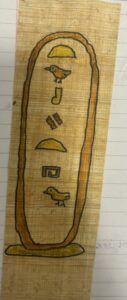
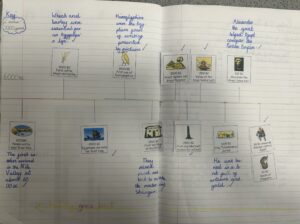
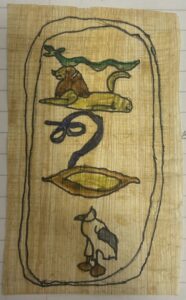
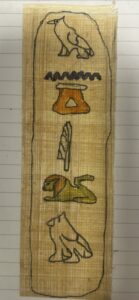
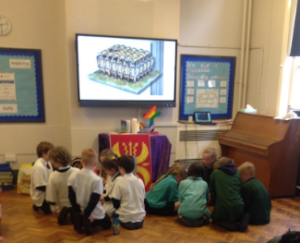
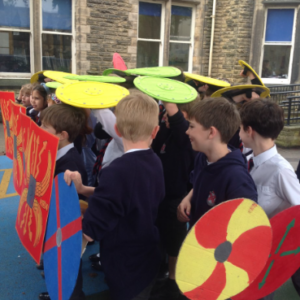
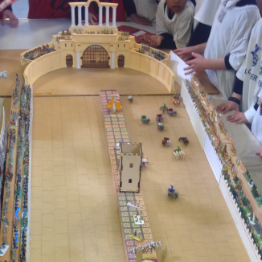
Children in Year Three and Four enjoyed lots of different educational, teambuilding activities during their Roman topic day. This included re- creating a Roman testudo formation and taking part in a Roman chariot race!
‘I find it interesting learning about the past and finding out how people had different lives to us’.
‘I really enjoy history- I didn’t know a lot about the Ancient Egyptians and now I know a lot!’
‘History is like stepping back in time’.
‘It’s fun, history teaches you about life’.
